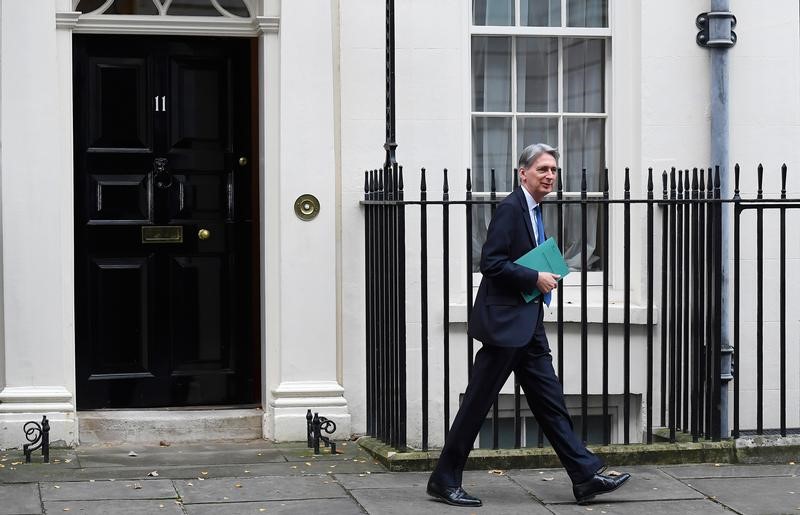By William Schomberg and David Milliken
LONDON (Reuters) - Britain has ramped up its borrowing outlook by much more than expected after forecasters said its vote to leave the European Union would hurt the economy, giving the government only a little room to ease looming pressure on households and firms.
Chancellor Philip Hammond said June's referendum result made it "more urgent than ever" to invest in tackling Britain's long-term weaknesses, such as productivity growth that is among the slowest of rich nations.
"Our task now is to prepare our economy to be resilient as we exit the EU and match-fit for the transition that will follow," Hammond told parliament on Wednesday to cheers from lawmakers in his ruling Conservative party.
To prepare Britain for Brexit, Hammond adopted a less rigid approach than his predecessor George Osborne to bringing down the deficit as he announced a fund to invest 23 billion pounds in rail, telecoms and housing infrastructure over the next five years.
But he and Prime Minister Theresa May have little room to raise public spending in a big way or cut taxes to help the world's fifth-largest economy as it prepares to leave the EU.
The government will need to borrow 122 billion pounds more over the next five years than it expected in March, about half of it reflecting the slowdown in growth that is likely to be caused by the Brexit vote, the official independent budget forecasters said.
The debt office then announced the biggest mid-year increase in government debt issuance since the financial crisis, pushing up yields on gilts sharply.
The economy has so far largely withstood the shock of the Brexit vote, wrong-footing the Bank of England - and almost all private economists - who expected a bigger immediate hit.
But PM May plans to start formal divorce talks by the end of March, ushering in years of uncertainty for businesses over the future shape of Britain's relationship with the world's biggest trading bloc. Furthermore, the prospect of a sharp rise in inflation next year is expected to squeeze living standards.
SLOWER GROWTH, MORE DEBT
The budget forecasters said gross domestic product would grow 1.4 percent in 2017 and 1.7 percent in 2018, down from March's pre-referendum estimates of 2.2 and 2.1 percent.
The Office for Budget Responsibility also said Brexit would lower trade flows, business investment and migration, cutting Britain's growth potential, although it said it remained in the dark about what kind of Brexit deal the government might seek.
Brexit supporters questioned the credibility of the latest OBR report, especially the forecasts for 2017.
Hammond set himself an easier target for the budget deficit, saying he was targeting a shortfall of less than 2 percent of GDP by 2020, excluding cyclical swings in the economy.
Previously, the government had targeted a surplus in the overall budget by the end of the decade, an increasingly tough challenge that prompted former Chancellor Osborne to announce an unpopular squeeze on spending.
Hammond reserved himself some "fiscal headroom" to spend more if the economy takes a turn for the worse. But his overall message was not radically different from Osborne's as he promised to get rid of the overall budget deficit as quickly as possible in the next parliament starting in 2020.
"Rumours of the death of austerity (are) greatly exaggerated," Osborne's former top adviser Rupert Harrison said.
Looking further ahead, the government will invest 1.0-1.2 percent of GDP on economic infrastructure from 2020, up from 0.8 percent now, Hammond said.
To soften the hit to living standards for poorer households, the government said it would raise the minimum wage, partly reverse planned cuts in benefits for low-earners and curb fees on renting property.
Shares in leading estate agents tumbled after Britain said it would ban one-off tenant fees to try to bring down the cost of renting, the latest move to hit landlords.
It will also extend a freeze on tax on vehicle fuel.
To make up for some of the extra spending, the government announced the latest increase in a tax on insurance premiums.
Torsten Bell, director of the Resolution Foundation think tank, said lower real earnings for workers and overall benefit cuts meant the poorest third of households face a fall in living standards by the end of the decade.
"Despite increasing borrowing elsewhere, the Chancellor has left the big welfare cuts intact and chosen not to provide significant support for the just managing families that Theresa May has rightly said she is focussed on," he said.
